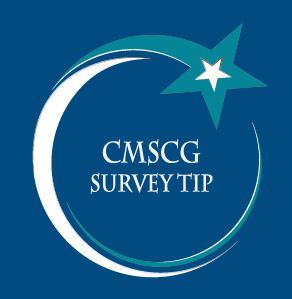Next up on the CMSCG Blog, we will be reviewing F605 Right to be Free from Chemical Restraints, a regulation that is part of the Freedom from Abuse, Neglect, and Exploitation regulatory group. F605, like most of the other regulations in this group, are lengthy, so this “Ftag of the Week” will be part of a series. F605 is not frequently cited during survey, but this blog series – including the actual citation examples provided – may give some providers material to think about auditing their facility practices a bit more closely.
F605 – Regulatory Requirements
The intent of this regulation, according to SOM Appendix PP, is for each resident to attain and maintain his/her highest practicable well-being in an environment that prohibits the use of chemical restraints. As such, the regulation at F605 states that nursing homes must ensure that each resident is free from chemical restraints:
- imposed for the purposes of discipline or convenience and
- that are not requirement to treat the resident’s medical symptoms

If the use of restraints is indicated, the facility is required to use the least restrictive alternative for the least amount of time. Ongoing re-evaluation of the need for use of a restraint must be documented. We can’t stress enough the importance of documentation of interventions attempted prior to the use of a chemical restraint.
Let’s review some key definitions used in this regulation before we dig into the guidance.
Definitions
“Chemical Restraint” – Any drug that is used for discipline or staff convenience and not required to treat medical symptoms

“Discipline” – Any action that is taken by facility staff for the purpose of punishing or penalizing a resident
“Convenience” – For the purposes of this regulation, this refers to the result of any action that results in altering a resident’s behavior, such that the resident requires less care or less effort from staff and is not in the resident’s best interest
“Medical Symptom” – An indication or characteristic of a medical, physical or psychological condition
As we review the nuances of this regulation, it’s paramount that staff remember the importance of the rationale for use of medications, including non-psychoactive medications, which can have a sedating effect.
Complaint Survey Citation – F605 S/S: D
A facility was cited for failure to ensure two residents were free from chemical restraints when it was identified that both residents were administered Benadryl for sleep. The medication was not ordered for a sleep-related condition. For one resident, the Physician’s orders were written for “itching.” On interview, the RN stated she administered the medication to the resident to help him/her sleep and that she had not been documenting it.
For the second resident, who also had an order for use of Benadryl for “itching,” an LPN noticed a discrepancy between the resident’s PRN order for Benadryl needing frequent refills and the MAR, which did not indicate the medication was administered. On interview, the LPN stated that the RN had reported to her during shift change report that she had administered Benadryl to the resident for sleep and did not document it on the MAR. The LPN reported this to the DON, who stated on interview that the RN had used Benadryl as a chemical restraint on both residents.
While this facility had the ability to quickly identify the concern that a PRN medication was administered for a reason other than prescribed by a physician, it’s worth mentioning that providers should ensure they have a system in place to ensure medications are being used for the reason they were ordered. Facilities need to ensure that there is a close working relationship between the medical practitioner, the nursing staff and the consultant pharmacist responsible for conducting the monthly drug regimen to prevent a medication from being inappropriately administered.
In the next part of our CMSCG “Ftag of the Week” series for F605 Chemical Restraints, we will look at indication for use and determination of medical symptoms.